外研版九年级下册Module 4Rules and suggestions Unit 3 课件 (共44张PPT)
文档属性
| 名称 | 外研版九年级下册Module 4Rules and suggestions Unit 3 课件 (共44张PPT) |
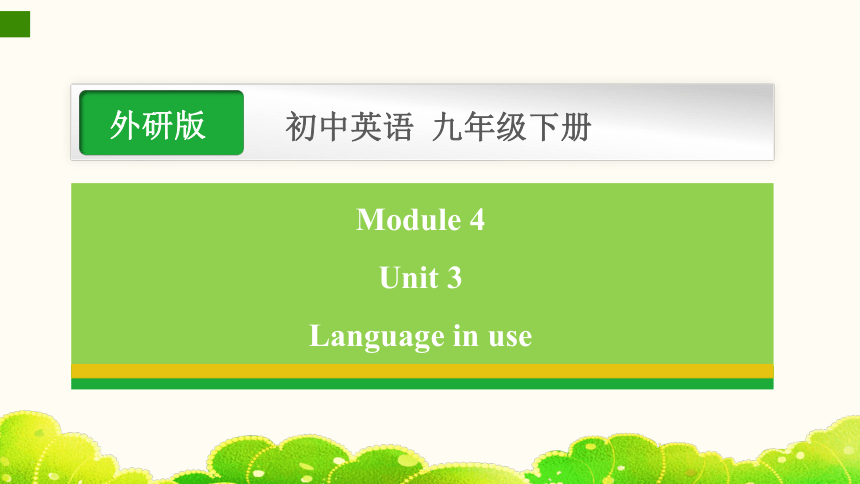
|
|
| 格式 | pptx | ||
| 文件大小 | 6.6MB | ||
| 资源类型 | 教案 | ||
| 版本资源 | 外研版 | ||
| 科目 | 英语 | ||
| 更新时间 | 2024-02-20 00:00:00 | ||
图片预览

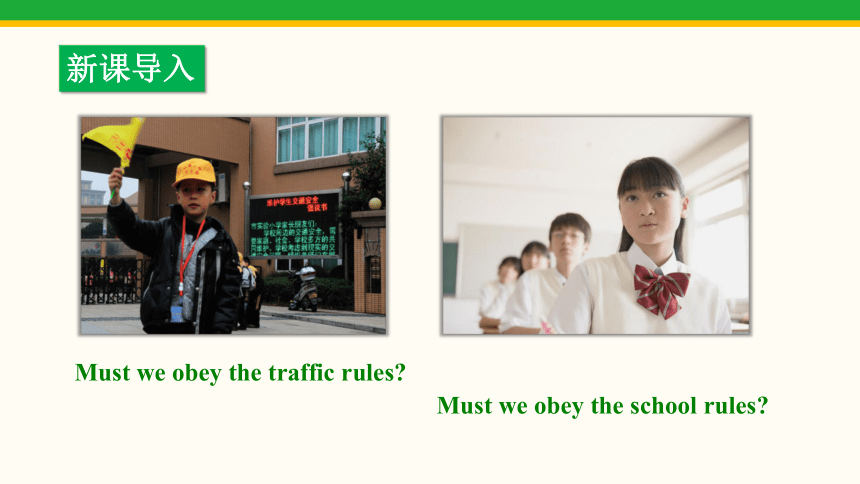
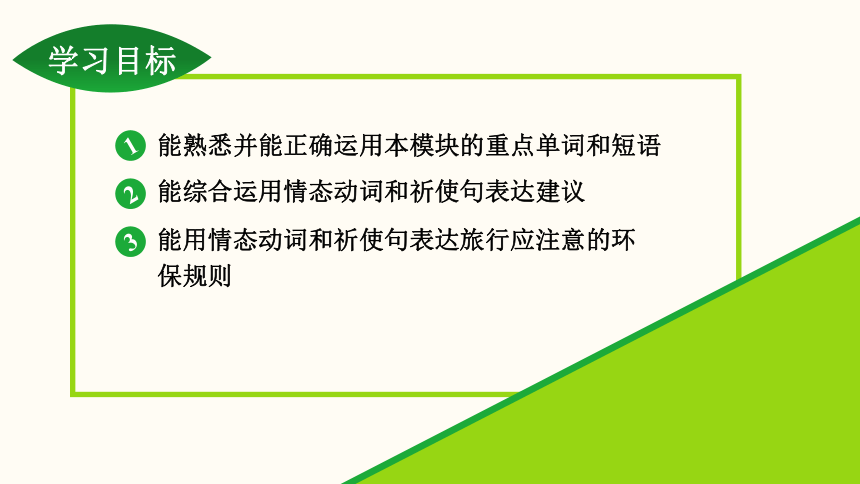
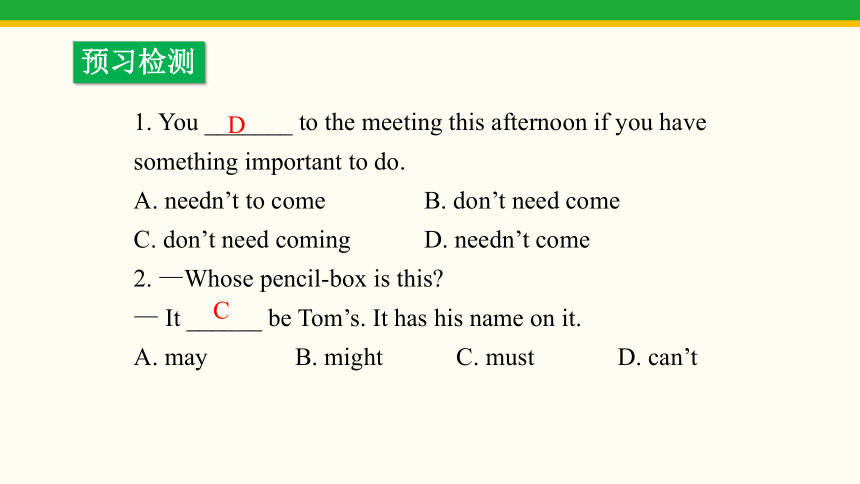
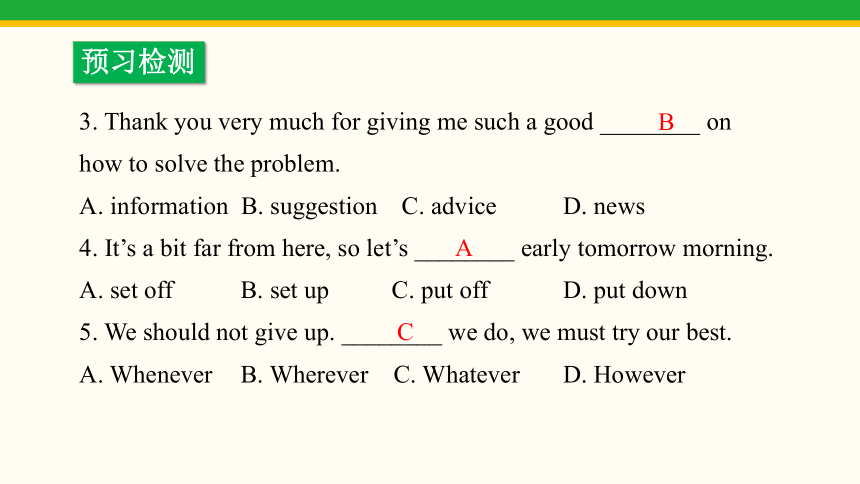
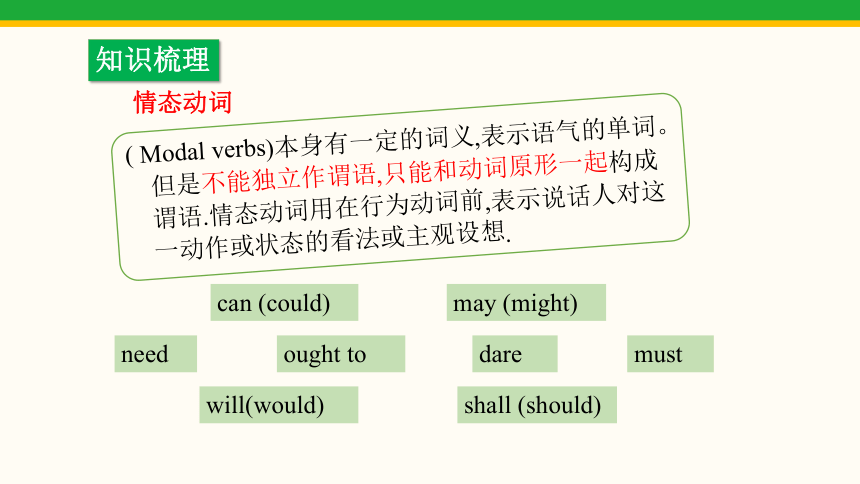
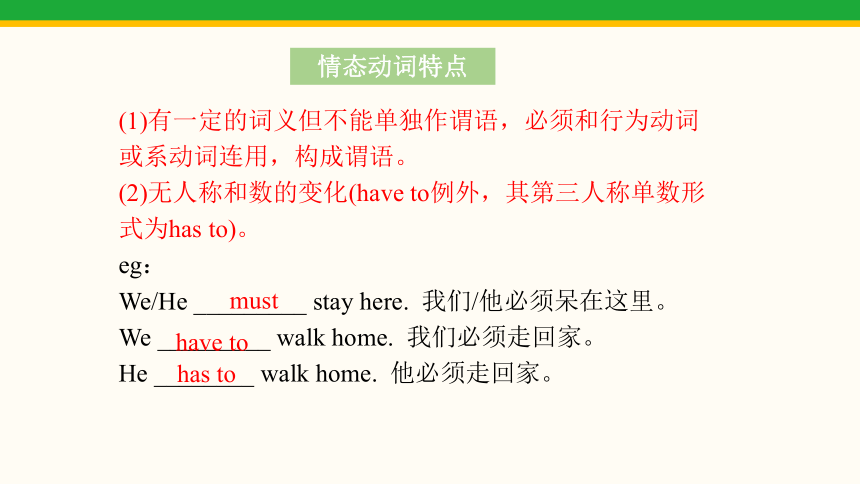
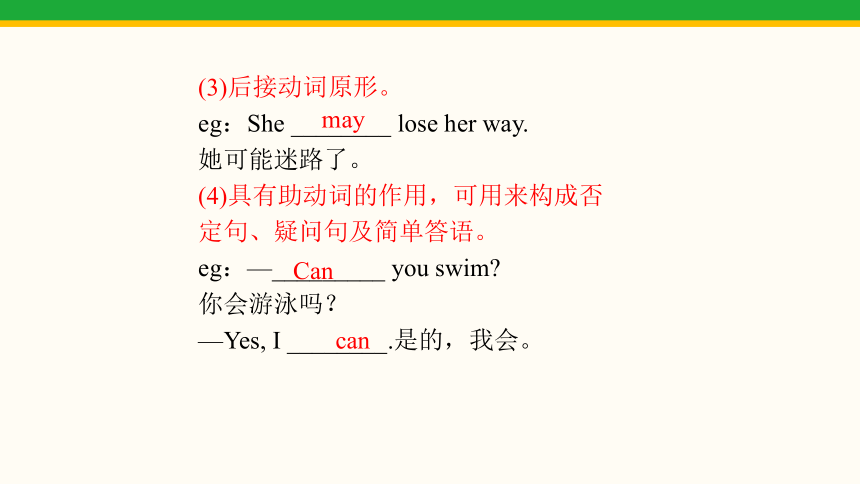
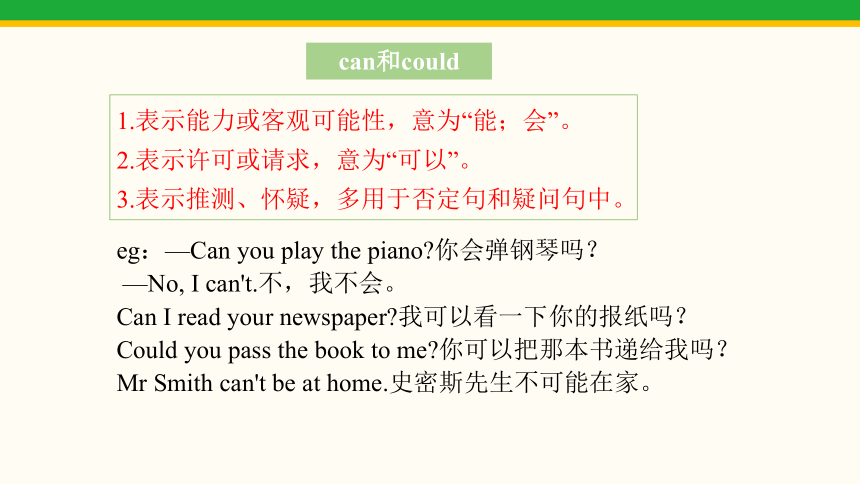
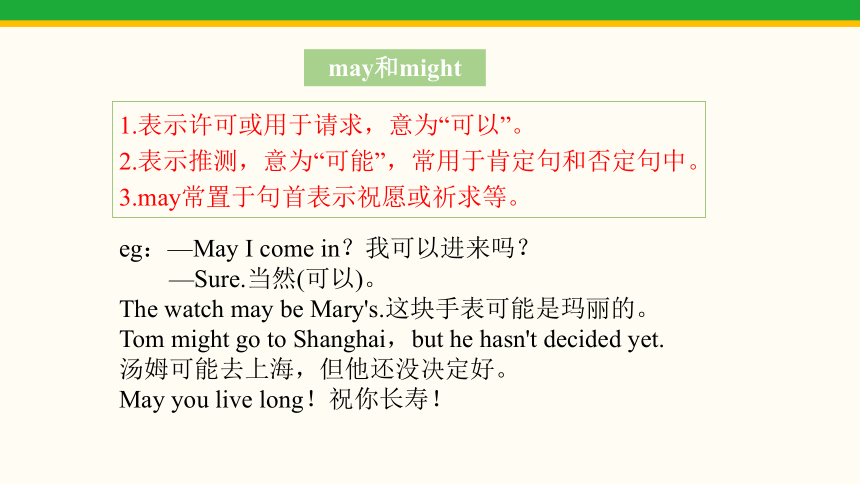
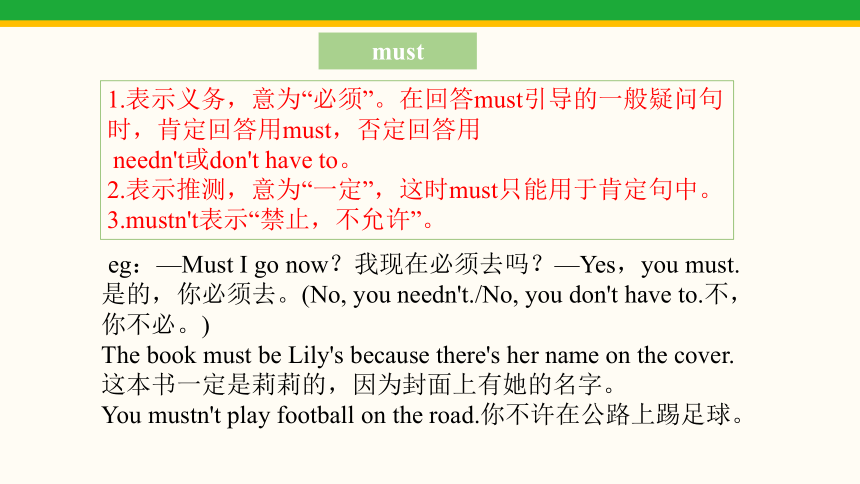
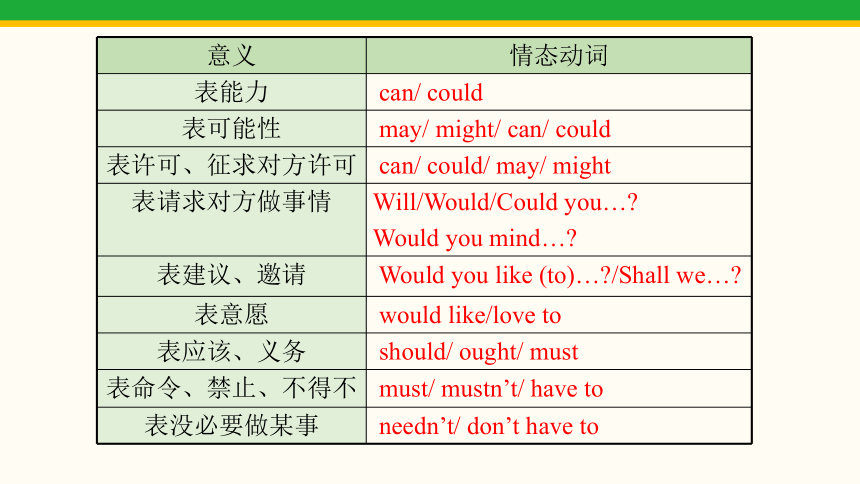
文档简介
(共44张PPT)
外研版
初中英语 九年级下册
Module 4
Unit 3
Language in use
新课导入
Must we obey the traffic rules
Must we obey the school rules
1
2
能熟悉并能正确运用本模块的重点单词和短语
能综合运用情态动词和祈使句表达建议
3
能用情态动词和祈使句表达旅行应注意的环保规则
预习检测
1. You _______ to the meeting this afternoon if you have something important to do.
A. needn’t to come B. don’t need come
C. don’t need coming D. needn’t come
2. —Whose pencil-box is this
— It ______ be Tom’s. It has his name on it.
A. may B. might C. must D. can’t
D
C
预习检测
3. Thank you very much for giving me such a good ________ on how to solve the problem.
A. information B. suggestion C. advice D. news
4. It’s a bit far from here, so let’s ________ early tomorrow morning.
A. set off B. set up C. put off D. put down
5. We should not give up. ________ we do, we must try our best.
A. Whenever B. Wherever C. Whatever D. However
B
A
C
知识梳理
may (might)
can (could)
need
ought to
shall (should)
must
( Modal verbs)本身有一定的词义,表示语气的单词。但是不能独立作谓语,只能和动词原形一起构成谓语.情态动词用在行为动词前,表示说话人对这一动作或状态的看法或主观设想.
will(would)
dare
情态动词
情态动词特点
(1)有一定的词义但不能单独作谓语,必须和行为动词或系动词连用,构成谓语。
(2)无人称和数的变化(have to例外,其第三人称单数形式为has to)。
eg:
We/He _________ stay here. 我们/他必须呆在这里。
We _________ walk home. 我们必须走回家。
He ________ walk home. 他必须走回家。
must
have to
has to
(3)后接动词原形。
eg:She ________ lose her way.
她可能迷路了。
(4)具有助动词的作用,可用来构成否定句、疑问句及简单答语。
eg:—_________ you swim
你会游泳吗?
—Yes, I ________.是的,我会。
may
Can
can
can和could
1.表示能力或客观可能性,意为“能;会”。
2.表示许可或请求,意为“可以”。
3.表示推测、怀疑,多用于否定句和疑问句中。
eg:—Can you play the piano 你会弹钢琴吗?
—No, I can't.不,我不会。
Can I read your newspaper 我可以看一下你的报纸吗?
Could you pass the book to me 你可以把那本书递给我吗?
Mr Smith can't be at home.史密斯先生不可能在家。
may和might
1.表示许可或用于请求,意为“可以”。
2.表示推测,意为“可能”,常用于肯定句和否定句中。
3.may常置于句首表示祝愿或祈求等。
eg:—May I come in?我可以进来吗?
—Sure.当然(可以)。
The watch may be Mary's.这块手表可能是玛丽的。
Tom might go to Shanghai,but he hasn't decided yet.
汤姆可能去上海,但他还没决定好。
May you live long!祝你长寿!
must
1.表示义务,意为“必须”。在回答must引导的一般疑问句时,肯定回答用must,否定回答用
needn't或don't have to。
2.表示推测,意为“一定”,这时must只能用于肯定句中。
3.mustn't表示“禁止,不允许”。
eg:—Must I go now?我现在必须去吗?—Yes,you must.是的,你必须去。(No, you needn't./No, you don't have to.不,你不必。)
The book must be Lily's because there's her name on the cover.这本书一定是莉莉的,因为封面上有她的名字。
You mustn't play football on the road.你不许在公路上踢足球。
意义 情态动词
表能力 can/ could
表可能性 may/ might/ can/ could
表许可、征求对方许可 can/ could/ may/ might
表请求对方做事情 Will/Would/Could you…
Would you mind…
表建议、邀请 Would you like (to)… /Shall we…
表意愿 would like/love to
表应该、义务 should/ ought/ must
表命令、禁止、不得不 must/ mustn’t/ have to
表没必要做某事 needn’t/ don’t have to
1.except / k'sept/ prep.除……之外
【辨析】 besides,except与except for
besides 指“除了……之外还”,具有附加性质,
常与other,else等连用(包含后面的内容)。
All of us passed the exam besides John.
except 指“除了;除……之外”,具有排他性,
不包括except后面的内容,且着重强调除去的部分,不可用but代替。
We're all here except Mary.
except for 除去的和非除去的不是同类事物时,
用except for(有“瑕不掩瑜”的含义)。
The movie was good except for the ending.
2.We hope tourists will play their part in keeping Canada’s forests clean too!
我们希望游客们也能在保护加拿大森林干净的行动发挥自己的作用!
【解读】play one’s/a part/role in doing sth. 意为“在……中扮演重要角色;发挥作用”。
e.g.Everyone should play a role/part in protecting the earth.
每个人都应该在保护地球中发挥重要作用。
综合运用情态动词和祈使句表达建议
Class, did you remember these words
can may must need
will would should might
have to used to ought to
Language practice
1. You must be careful of falling stones.
2. You mustn’t walk too close to the edge of the hill path because you might fall and hurt yourselves.
3. You should always wear proper clothes.
4. Bears might think our rubbish is food.
5. —Can we go rock climbing
—No, you can’t.
1.Match the signs with the rules and warnings.
1 No smoking.
2 No eating or drinking.
3 Children crossing.
4 Danger! Be careful of falling rocks.
5 Children should be taken care of by parents.
6 Do not drink and drive.
c
b
d
e
f
a
2.Read the list of rules and write sentences
using must, mustn't, should or shouldn't.
London Indoor Climbing Centre
Visitors please note:
Dos
● Check in at the main gate when you come to the centre.
● Climb with someone.
● Wear a hard hat at all times.
● Wear the correct climbing shoes.
● Wear comfortable clothes.
● Don’t climb without a rope.
● Don’t eat or drink anywhere except in the restaurant.
● Don’t listen to personal music players while climbing.
● Don’t talk on a mobile phone while climbing.
Don'ts
We shouldn’t listen to music players while climbing.
We should wear comfortable clothes.
We should wear the correct climbing shoes.
We mustn’t climb without a rope!
We shouldn’t talk on a mobile phone while climbing.
We must climb with someone!
Answers:
You must check in at the main gate when you come to the center.
You must climb with someone.
You must wear a hard hat at all times.
You must wear the correct climbing shoes.
You should wear comfortable clothes.
You mustn’t climb without a rope.
You mustn’t eat or drink anywhere except in the restaurant.
You shouldn’t listen to personal music players while climbing.
You mustn’t talk on a mobile phone while climbing.
3.Work in pairs. Explain why the rules in Activity 2 are important.
—Why must you check in when you come to the centre
—Because they want to know who is there.
1. Why must you climb with someone
2. Why must you wear comfortable clothes
3. Why mustn’t you climb without a rope
4. Why shouldn’t you listen to music while climbing
Because you can ask for help if you meet some problems.
1 Why must you climb with someone
2 Why must you wear comfortable clothes
3 Why mustn’t you climb without a rope
4 Why shouldn’t you listen to music while climbing
Because comfortable clothes can make you less tired.
Because you can hear what is going on around you.
Because it is dangerous.
通过以
活动小结
通过以上活动,我们可以知道:can或could表示1.____________,may/ might或 can/ could表示2._______________,needn’t, don’t have to 等表示3._________________。
能力
可能性
没有必要
探究二
用情态动词和祈使句表达旅行应注意的环保规则
4.Complete the passage with the correct form.
although keep stream tourist worry
People are very (1) _______ about the conditions of the ancient forests of Canada and want to save them. Many visitors to the forests use knives to cut their names into the trees, some of which are hundreds of years old. (2) ________ there are litter bins, people still throw rubbish into the (3) _______ and this causes plants and fish to die.
People from local villages have helped clean up the forests. We hope (4) _______ will play their part in (5) ________ Canada’s forests clean too!
worried
Although
stream
tourists
keeping
1 You should ___________________________
_____________________________________.
2 You shouldn’t _________________________
_____________________________________.
3 You must_____________________________
_____________________________________.
4 You mustn’t __________________________
_____________________________________.
Now write possible rules for visitors to the forests.
throw litters into the litter bins or take them with you
wear comfortable shoes because the road is not smooth
walk alone because there might be dangers in the forest
damage the trees, plants and everything in the forest
5 He lifted up the ____ and pointed it at the bear.
6 There was a ______ noise in the woods and we all
stopped moving.
7 Birds use small _____ and leaves to make a home.
5.Complete the sentences with the words.
gun smooth sticks stone sudden tent whenever
1 Come and visit me _________ you have time.
2 The wall is made of ______.
3 The path to the top is not very_______.
4 Remember to take a ____ with you to sleep in, because it might rain.
whenever
stones
smooth
tent
gun
sudden
sticks
1 What does Zhang Wenpeng try to say with his drawing
2 What does Zhou Zhiyun try to say with his painting
6.Read the passage and answer the questions.
3 What does the school suggest the students should do
4 How can a school become a “green school”
With his drawing in his hand, twelve-year-old Zhang Wenpeng said that people must wake up to the fact that pollution is causing damage to the progress we've made.
“To save water is to save lives,” he said.
His classmate from the same primary school in the hilly countryside of western China, eleven-year-old Zhou Zhiyun, has painted a big shining light, with the message that people must
not waste electricity.
The students were members of a project to discuss “changes in the climate all over the world and what we can do about them”.
The school suggested that the students should pass on what they have learnt in school to their parents and neighbours.
“I told my family why we should turn off the light when we leave a room,” said one student.
China now has many green schools like this one.
In order to become a “green school”, a school must include education about the environment as part of the timetable.
“Education is important and can help children and young people change their habits. At the same time, they can pass on knowledge to their neighbours,” said a director of the Ministry of Environmental Protection.
1 What does Zhang Wenpeng try to say with his drawing
2 What does Zhou Zhiyun try to say with his painting
He tries to tell people that pollution is causing damage to the progress we’ve made.
He tries to tell people that people must
not waste electricity.
3 What does the school suggest the students should do
4 How can a school become a “green school”
The school suggested that the students should
pass on what they have learnt in school to
their parents and neighbours.
It must include education about the
environment as part of the timetable.
twelve-year-old
wake up to
make progress
cause ...to...
all over the world
pass on sth. to sb.
turn off
in order to
at the same time
12岁的
认识到,意识到
取得进步
导致
全世界
把...传递给...
关掉
为了;目的是
同时
Find key phrases and solve them.
7.Listen and complete the sentences.
1 The first thing you have to do is to____________
carefully.
2 Think about where ___________________ and
whether there are ______________________.
3 You should only take marked _____________.
plan the walk
you are going to walk
clearly marked paths
paths
4 Make sure you know where _____________ for lunch.
5 Don’t forget to tell people to ___________for the picnic.
6 Don’t walk when it is _______or in ________________.
7 You must not try out a _________with a group.
you can stop
bring food
too hot
very bad weather
new walk
百科知识之生态旅游
“生态旅游”这一术语,是由世界自然保护联盟(IUCN)于1983年首先提出,1993年国际生态旅游协会把其定义为:具有保护自然环境和维护当地人民生活双重责任的旅游活动。是指以可持续发展为理念,以保护生态环境为前提,以统筹人与自然和谐发展为准则,并依托良好的自然生态环境和独特的人文生态系统,采取生态友好方式,开展的生态体验、生态教育、生态认知并获得心身愉悦的旅游方式。
在国内,开放的生态旅游区主要有森林公园、风景名胜区、自然保护区等。生态旅游开发较早、开发较为成熟的地区主要有香格里拉、中甸、西双版纳、长白山、澜沧江流域、鼎湖山、广东肇庆、新疆哈纳斯等地区。
Ecotourism
Ecotourism is also known as “responsible tourism”. It means you visit places without damaging the environment. Many countries around the world have started ecotourism holidays and trips.Tourists help the local communities look after their natural environment. Here are some rules of ecotourism.
Dos
● Take rubbish away with you.
● Walk on paths or roads.
● Take photos but nothing else.
Don'ts
● Don’t pick flowers or damage trees.
● Don’t pollute rivers or streams.
● Don’t make open fires in the forests.
Ecotourism
be known as
responsible tourism
ecotourism holidays and trips
look after
local communities
make open fires
作为...而出名
负责任的旅游
生态旅游度假
照顾,照看
当地组织
使用明火
Find key expressions and solve them.
● visiting someone’s home
● eating and drinking
● travelling on public transport
● behaving politely in public
● visiting tourist sights
8.Work in pairs. Discuss and give advice for visitors to China. Talk about:
Module task: Writing advice for visitors to China
Take a little gift to show your respect.
Do not be late.
Visiting someone’s home
Eating and drinking
Wait for the elder to start first.
Do not talk with food in the mouth.
Travelling on public transport
Give the seat to those who need help.
Do not eat and talk loudly.
Take care of your personal staff.
Behaving politely in public
Do not make too much noise.
Do not smoke.
Wear smiles and be friendly.
Visiting tourist sights
Throw the litter into the trash bins.
Do not break public facilities.
Speak and behave politely.
You must…
You mustn’t…
You should…
You shouldn’t…
9.Write your advice.
So, what’s your advice for visitors to China Share with us, please!
10.Work in groups and compare your advice. Choose the five most useful pieces of advice for visitors to China.
It’s time to share your ideas!
通过以上的活动,我们通过以上的活动,我们可以了解到,“10年之后”可以表达为1. ;“你的学校将会是什么样的”可以通过以上的活动,我们可以了解到,“10年之后”可以表达为1. ;“你的学校将会是什么样的”可以说成2. ;“将来的学校会不同吗?”可以表达为3. 。说成2. ;“将来的学校会不同吗?”可以表达为3. 。可以了解到,“10年之后”可以表达为1. ;“你的学校将会是什么样的”可以说成2. ;“将来的学校会不同吗?”可以表达为3. 。
活动小结
通过以上活动,我们可以知道:Some rules of ecotourism: Dos 1. Take rubbish away with you. 2.Walk on paths or roads. 3._______________________. Don’ts
4.Don’t pick flowers or damage trees. 5.Don’t pollute rivers or streams. 6.__________________.
Take photos but nothing else
Don’t make open fires in the forests
当堂检测
选用适当的词, 并用其正确形式填空
1. Don’t you see the sign Silence. You ______ talk.
2. It is noisy. I ______ hear you.
3. You ______ use the computer if you like.
4. Lucy’s parents are proud of her. She ______ speak four languages.
5. You ______ pay him for the newspaper.
6. I ______ go now. Thank you for your dinner.
7. It’s raining heavily outside. He______ stay at home watching TV.
can may have to can’t must mustn’t should
mustn’t
can’t
may
can
should
must
has to
掌握情态动词和祈使句的用法
重点单词:gun,smooth,sticks,stone,
sudden,whenever,stream, tourist
重点短语:wake up to,pass on sth. to sb.,be known as,local communities,
cause...to...,responsible tourism,
make progress,make open fires
Module 4
Unit 3
用情态动词和祈使句表达旅行应注意的环保规则
外研版
初中英语 九年级下册
Module 4
Unit 3
Language in use
新课导入
Must we obey the traffic rules
Must we obey the school rules
1
2
能熟悉并能正确运用本模块的重点单词和短语
能综合运用情态动词和祈使句表达建议
3
能用情态动词和祈使句表达旅行应注意的环保规则
预习检测
1. You _______ to the meeting this afternoon if you have something important to do.
A. needn’t to come B. don’t need come
C. don’t need coming D. needn’t come
2. —Whose pencil-box is this
— It ______ be Tom’s. It has his name on it.
A. may B. might C. must D. can’t
D
C
预习检测
3. Thank you very much for giving me such a good ________ on how to solve the problem.
A. information B. suggestion C. advice D. news
4. It’s a bit far from here, so let’s ________ early tomorrow morning.
A. set off B. set up C. put off D. put down
5. We should not give up. ________ we do, we must try our best.
A. Whenever B. Wherever C. Whatever D. However
B
A
C
知识梳理
may (might)
can (could)
need
ought to
shall (should)
must
( Modal verbs)本身有一定的词义,表示语气的单词。但是不能独立作谓语,只能和动词原形一起构成谓语.情态动词用在行为动词前,表示说话人对这一动作或状态的看法或主观设想.
will(would)
dare
情态动词
情态动词特点
(1)有一定的词义但不能单独作谓语,必须和行为动词或系动词连用,构成谓语。
(2)无人称和数的变化(have to例外,其第三人称单数形式为has to)。
eg:
We/He _________ stay here. 我们/他必须呆在这里。
We _________ walk home. 我们必须走回家。
He ________ walk home. 他必须走回家。
must
have to
has to
(3)后接动词原形。
eg:She ________ lose her way.
她可能迷路了。
(4)具有助动词的作用,可用来构成否定句、疑问句及简单答语。
eg:—_________ you swim
你会游泳吗?
—Yes, I ________.是的,我会。
may
Can
can
can和could
1.表示能力或客观可能性,意为“能;会”。
2.表示许可或请求,意为“可以”。
3.表示推测、怀疑,多用于否定句和疑问句中。
eg:—Can you play the piano 你会弹钢琴吗?
—No, I can't.不,我不会。
Can I read your newspaper 我可以看一下你的报纸吗?
Could you pass the book to me 你可以把那本书递给我吗?
Mr Smith can't be at home.史密斯先生不可能在家。
may和might
1.表示许可或用于请求,意为“可以”。
2.表示推测,意为“可能”,常用于肯定句和否定句中。
3.may常置于句首表示祝愿或祈求等。
eg:—May I come in?我可以进来吗?
—Sure.当然(可以)。
The watch may be Mary's.这块手表可能是玛丽的。
Tom might go to Shanghai,but he hasn't decided yet.
汤姆可能去上海,但他还没决定好。
May you live long!祝你长寿!
must
1.表示义务,意为“必须”。在回答must引导的一般疑问句时,肯定回答用must,否定回答用
needn't或don't have to。
2.表示推测,意为“一定”,这时must只能用于肯定句中。
3.mustn't表示“禁止,不允许”。
eg:—Must I go now?我现在必须去吗?—Yes,you must.是的,你必须去。(No, you needn't./No, you don't have to.不,你不必。)
The book must be Lily's because there's her name on the cover.这本书一定是莉莉的,因为封面上有她的名字。
You mustn't play football on the road.你不许在公路上踢足球。
意义 情态动词
表能力 can/ could
表可能性 may/ might/ can/ could
表许可、征求对方许可 can/ could/ may/ might
表请求对方做事情 Will/Would/Could you…
Would you mind…
表建议、邀请 Would you like (to)… /Shall we…
表意愿 would like/love to
表应该、义务 should/ ought/ must
表命令、禁止、不得不 must/ mustn’t/ have to
表没必要做某事 needn’t/ don’t have to
1.except / k'sept/ prep.除……之外
【辨析】 besides,except与except for
besides 指“除了……之外还”,具有附加性质,
常与other,else等连用(包含后面的内容)。
All of us passed the exam besides John.
except 指“除了;除……之外”,具有排他性,
不包括except后面的内容,且着重强调除去的部分,不可用but代替。
We're all here except Mary.
except for 除去的和非除去的不是同类事物时,
用except for(有“瑕不掩瑜”的含义)。
The movie was good except for the ending.
2.We hope tourists will play their part in keeping Canada’s forests clean too!
我们希望游客们也能在保护加拿大森林干净的行动发挥自己的作用!
【解读】play one’s/a part/role in doing sth. 意为“在……中扮演重要角色;发挥作用”。
e.g.Everyone should play a role/part in protecting the earth.
每个人都应该在保护地球中发挥重要作用。
综合运用情态动词和祈使句表达建议
Class, did you remember these words
can may must need
will would should might
have to used to ought to
Language practice
1. You must be careful of falling stones.
2. You mustn’t walk too close to the edge of the hill path because you might fall and hurt yourselves.
3. You should always wear proper clothes.
4. Bears might think our rubbish is food.
5. —Can we go rock climbing
—No, you can’t.
1.Match the signs with the rules and warnings.
1 No smoking.
2 No eating or drinking.
3 Children crossing.
4 Danger! Be careful of falling rocks.
5 Children should be taken care of by parents.
6 Do not drink and drive.
c
b
d
e
f
a
2.Read the list of rules and write sentences
using must, mustn't, should or shouldn't.
London Indoor Climbing Centre
Visitors please note:
Dos
● Check in at the main gate when you come to the centre.
● Climb with someone.
● Wear a hard hat at all times.
● Wear the correct climbing shoes.
● Wear comfortable clothes.
● Don’t climb without a rope.
● Don’t eat or drink anywhere except in the restaurant.
● Don’t listen to personal music players while climbing.
● Don’t talk on a mobile phone while climbing.
Don'ts
We shouldn’t listen to music players while climbing.
We should wear comfortable clothes.
We should wear the correct climbing shoes.
We mustn’t climb without a rope!
We shouldn’t talk on a mobile phone while climbing.
We must climb with someone!
Answers:
You must check in at the main gate when you come to the center.
You must climb with someone.
You must wear a hard hat at all times.
You must wear the correct climbing shoes.
You should wear comfortable clothes.
You mustn’t climb without a rope.
You mustn’t eat or drink anywhere except in the restaurant.
You shouldn’t listen to personal music players while climbing.
You mustn’t talk on a mobile phone while climbing.
3.Work in pairs. Explain why the rules in Activity 2 are important.
—Why must you check in when you come to the centre
—Because they want to know who is there.
1. Why must you climb with someone
2. Why must you wear comfortable clothes
3. Why mustn’t you climb without a rope
4. Why shouldn’t you listen to music while climbing
Because you can ask for help if you meet some problems.
1 Why must you climb with someone
2 Why must you wear comfortable clothes
3 Why mustn’t you climb without a rope
4 Why shouldn’t you listen to music while climbing
Because comfortable clothes can make you less tired.
Because you can hear what is going on around you.
Because it is dangerous.
通过以
活动小结
通过以上活动,我们可以知道:can或could表示1.____________,may/ might或 can/ could表示2._______________,needn’t, don’t have to 等表示3._________________。
能力
可能性
没有必要
探究二
用情态动词和祈使句表达旅行应注意的环保规则
4.Complete the passage with the correct form.
although keep stream tourist worry
People are very (1) _______ about the conditions of the ancient forests of Canada and want to save them. Many visitors to the forests use knives to cut their names into the trees, some of which are hundreds of years old. (2) ________ there are litter bins, people still throw rubbish into the (3) _______ and this causes plants and fish to die.
People from local villages have helped clean up the forests. We hope (4) _______ will play their part in (5) ________ Canada’s forests clean too!
worried
Although
stream
tourists
keeping
1 You should ___________________________
_____________________________________.
2 You shouldn’t _________________________
_____________________________________.
3 You must_____________________________
_____________________________________.
4 You mustn’t __________________________
_____________________________________.
Now write possible rules for visitors to the forests.
throw litters into the litter bins or take them with you
wear comfortable shoes because the road is not smooth
walk alone because there might be dangers in the forest
damage the trees, plants and everything in the forest
5 He lifted up the ____ and pointed it at the bear.
6 There was a ______ noise in the woods and we all
stopped moving.
7 Birds use small _____ and leaves to make a home.
5.Complete the sentences with the words.
gun smooth sticks stone sudden tent whenever
1 Come and visit me _________ you have time.
2 The wall is made of ______.
3 The path to the top is not very_______.
4 Remember to take a ____ with you to sleep in, because it might rain.
whenever
stones
smooth
tent
gun
sudden
sticks
1 What does Zhang Wenpeng try to say with his drawing
2 What does Zhou Zhiyun try to say with his painting
6.Read the passage and answer the questions.
3 What does the school suggest the students should do
4 How can a school become a “green school”
With his drawing in his hand, twelve-year-old Zhang Wenpeng said that people must wake up to the fact that pollution is causing damage to the progress we've made.
“To save water is to save lives,” he said.
His classmate from the same primary school in the hilly countryside of western China, eleven-year-old Zhou Zhiyun, has painted a big shining light, with the message that people must
not waste electricity.
The students were members of a project to discuss “changes in the climate all over the world and what we can do about them”.
The school suggested that the students should pass on what they have learnt in school to their parents and neighbours.
“I told my family why we should turn off the light when we leave a room,” said one student.
China now has many green schools like this one.
In order to become a “green school”, a school must include education about the environment as part of the timetable.
“Education is important and can help children and young people change their habits. At the same time, they can pass on knowledge to their neighbours,” said a director of the Ministry of Environmental Protection.
1 What does Zhang Wenpeng try to say with his drawing
2 What does Zhou Zhiyun try to say with his painting
He tries to tell people that pollution is causing damage to the progress we’ve made.
He tries to tell people that people must
not waste electricity.
3 What does the school suggest the students should do
4 How can a school become a “green school”
The school suggested that the students should
pass on what they have learnt in school to
their parents and neighbours.
It must include education about the
environment as part of the timetable.
twelve-year-old
wake up to
make progress
cause ...to...
all over the world
pass on sth. to sb.
turn off
in order to
at the same time
12岁的
认识到,意识到
取得进步
导致
全世界
把...传递给...
关掉
为了;目的是
同时
Find key phrases and solve them.
7.Listen and complete the sentences.
1 The first thing you have to do is to____________
carefully.
2 Think about where ___________________ and
whether there are ______________________.
3 You should only take marked _____________.
plan the walk
you are going to walk
clearly marked paths
paths
4 Make sure you know where _____________ for lunch.
5 Don’t forget to tell people to ___________for the picnic.
6 Don’t walk when it is _______or in ________________.
7 You must not try out a _________with a group.
you can stop
bring food
too hot
very bad weather
new walk
百科知识之生态旅游
“生态旅游”这一术语,是由世界自然保护联盟(IUCN)于1983年首先提出,1993年国际生态旅游协会把其定义为:具有保护自然环境和维护当地人民生活双重责任的旅游活动。是指以可持续发展为理念,以保护生态环境为前提,以统筹人与自然和谐发展为准则,并依托良好的自然生态环境和独特的人文生态系统,采取生态友好方式,开展的生态体验、生态教育、生态认知并获得心身愉悦的旅游方式。
在国内,开放的生态旅游区主要有森林公园、风景名胜区、自然保护区等。生态旅游开发较早、开发较为成熟的地区主要有香格里拉、中甸、西双版纳、长白山、澜沧江流域、鼎湖山、广东肇庆、新疆哈纳斯等地区。
Ecotourism
Ecotourism is also known as “responsible tourism”. It means you visit places without damaging the environment. Many countries around the world have started ecotourism holidays and trips.Tourists help the local communities look after their natural environment. Here are some rules of ecotourism.
Dos
● Take rubbish away with you.
● Walk on paths or roads.
● Take photos but nothing else.
Don'ts
● Don’t pick flowers or damage trees.
● Don’t pollute rivers or streams.
● Don’t make open fires in the forests.
Ecotourism
be known as
responsible tourism
ecotourism holidays and trips
look after
local communities
make open fires
作为...而出名
负责任的旅游
生态旅游度假
照顾,照看
当地组织
使用明火
Find key expressions and solve them.
● visiting someone’s home
● eating and drinking
● travelling on public transport
● behaving politely in public
● visiting tourist sights
8.Work in pairs. Discuss and give advice for visitors to China. Talk about:
Module task: Writing advice for visitors to China
Take a little gift to show your respect.
Do not be late.
Visiting someone’s home
Eating and drinking
Wait for the elder to start first.
Do not talk with food in the mouth.
Travelling on public transport
Give the seat to those who need help.
Do not eat and talk loudly.
Take care of your personal staff.
Behaving politely in public
Do not make too much noise.
Do not smoke.
Wear smiles and be friendly.
Visiting tourist sights
Throw the litter into the trash bins.
Do not break public facilities.
Speak and behave politely.
You must…
You mustn’t…
You should…
You shouldn’t…
9.Write your advice.
So, what’s your advice for visitors to China Share with us, please!
10.Work in groups and compare your advice. Choose the five most useful pieces of advice for visitors to China.
It’s time to share your ideas!
通过以上的活动,我们通过以上的活动,我们可以了解到,“10年之后”可以表达为1. ;“你的学校将会是什么样的”可以通过以上的活动,我们可以了解到,“10年之后”可以表达为1. ;“你的学校将会是什么样的”可以说成2. ;“将来的学校会不同吗?”可以表达为3. 。说成2. ;“将来的学校会不同吗?”可以表达为3. 。可以了解到,“10年之后”可以表达为1. ;“你的学校将会是什么样的”可以说成2. ;“将来的学校会不同吗?”可以表达为3. 。
活动小结
通过以上活动,我们可以知道:Some rules of ecotourism: Dos 1. Take rubbish away with you. 2.Walk on paths or roads. 3._______________________. Don’ts
4.Don’t pick flowers or damage trees. 5.Don’t pollute rivers or streams. 6.__________________.
Take photos but nothing else
Don’t make open fires in the forests
当堂检测
选用适当的词, 并用其正确形式填空
1. Don’t you see the sign Silence. You ______ talk.
2. It is noisy. I ______ hear you.
3. You ______ use the computer if you like.
4. Lucy’s parents are proud of her. She ______ speak four languages.
5. You ______ pay him for the newspaper.
6. I ______ go now. Thank you for your dinner.
7. It’s raining heavily outside. He______ stay at home watching TV.
can may have to can’t must mustn’t should
mustn’t
can’t
may
can
should
must
has to
掌握情态动词和祈使句的用法
重点单词:gun,smooth,sticks,stone,
sudden,whenever,stream, tourist
重点短语:wake up to,pass on sth. to sb.,be known as,local communities,
cause...to...,responsible tourism,
make progress,make open fires
Module 4
Unit 3
用情态动词和祈使句表达旅行应注意的环保规则
同课章节目录
- Module 1 Travel
- Unit 1 We toured the city by bus and by taxi
- Unit 2 It's a long story.
- Unit 3 Language in use
- Module 2 Education
- Unit 1 They don't sit in rows.
- Unit 2 What do I like best about school?
- Unit 3 Language in use
- Module 3 Life now and then
- Unit 1 They sometimes work harder.
- Unit 2 I think life is better today.
- Unit 3 Language in use.
- Module 4 Rules and suggestions
- Unit 1 You must be careful of falling stones.
- Unit 2 we must keep the camp clean.
- Unit 3 Language in use.
- Revison A
- Module 5 Look after yourself
- Unit 1 We'd better get you to hospital.
- Unit 2 Get off the sofa!
- Unit 3 Language in use.
- Module 6 Eating togethe
- Unit 1 When is the school-leavers' party?
- Unit 2 Knives and forks are used for most Western
- Unit 3 Language in use
- Module 7 English for you and me
- Unit 1 Have you ever been to an English corner?
- Unit 2 We all own English.
- Unit 3 Language in use
- Module 8 My future life
- Unit 1 Here's to our friendship and the future
- Unit 2 I know that you will be better at maths.
- Unit 3 Language in use
- Revison B
